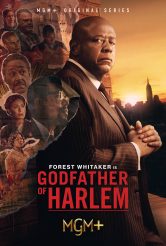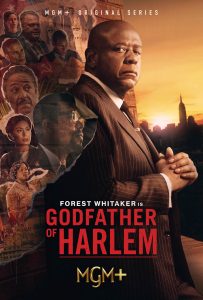GODFATHER OF HARLEM is back for its third season, Sunday nights on MGM+ (formerly Epix). The series, created by Chris Brancato & Paul Eckstein, chronicles the life and times of real-world New York gangster Ellsworth “Bumpy” Johnson (played by Forest Whitaker), who ran Black Harlem’s drug trade in the ‘60s, frequently clashing with the Italian Mafia. At the same time, Johnson was friends with Malcolm X (played in Season 3 by Jason Alan Carvell, after being portrayed by Nigél Thatch in Seasons 1 and 2), and had a complicated adversary/ally relationship with Harlem Congressman Adam Clayton Powell (Giancarlo Esposito).
At the start of Season 3, which runs for ten episodes, Bumpy is once again trying to figure out how to pit the various Mafia families against each other, while he reaches out to the Cuban community. Meanwhile, Malcolm is now functioning outside the Nation of Islam, which does not sit well with the Nation’s founder nor its members.
Brancato and Eckstein, who were two of the creators of NARCOS, had previously dealt with Johnson’s story in the 1997 feature film HOODLUM. Brancato had written the screenplay and both he and Eckstein were co-producers on the film, which starred Laurence Fishburne and explored Johnson’s earlier exploits in the Harlem of the 1930s.
Eckstein and Brancato, both executive producers on GODFATHER OF HARLEM, sit down at the Langham Hotel in Pasadena to talk Season 3.
ASSIGNMENT X: Season 1 of GODFATHER OF HARLEM took place in 1963 and Season 2 was set in 1964. Is the plan to do one year per season?
CHRIS BRANCATO: I think in the original plan was to do ’63 as the first year, and ’64 as the second, and ’65 as the third. But because we decided to end Season 2 at the Harlem riots, which was the end of July of ’64, we then scrapped the one year per season thing, and so we picked up Season 3 three days after the riots. So, we’re in late July or early August of ’64. And we’ll play this season all the way until February 21, 1965, which is the day of Malcolm’s assassination.
AX: You had said in a previous interview that you couldn’t wait to get to 1964 in the storyline. Was that the riots, or is that something that’s coming up this season?
PAUL ECKSTEIN: Well, that’s both. Certainly, the riots, but I couldn’t wait to get to ’64, because we really get to tell the story of Malcolm X, and his last months in time, and the story of his assassination, that we’d learned through extensive research. It’s a new day, where you can get information that you couldn’t get before, that lets this story be more than just about the civil rights of Americans. It speaks to a much bigger world that Malcolm was involved in.
BRANCATO: I think you’re hitting on something important, which is, in Season 3, Malcolm goes to Mecca. He goes to Africa in our show. There’s a widening of the lens beyond Harlem, as Malcolm travels. And so, that that’s why ’64 is so interesting to us. It was a change, in that Malcolm was no longer in the Nation of Islam. Malcolm was forming his own organization. There were so many things going on in the world that felt like we could at least tip a hat to them, even though our show is centered in Harlem, and it’s called GODFATHER OF HARLEM.
AX: You have a different actor, Jason Alan Carvell, playing Malcolm X this season, after Nigél Thatch played him in the first two seasons …
BRANCATO: [Season 3] started shooting months later than it was supposed to because of things that don’t have anything to do with creative. [It had] to do with business stuff between companies. And that punted us into a place where Nigél had other things that he had committed to do. And so, we were forced to do the thing you never want to do, which is take a brilliant performance that an actor has crafted and have to recast him, but we had no choice.
So, we went out far and wide, and we ultimately landed on Jason Alan Carvell, who, when we were looking at our two last choices, Forest watched and weighed in. He said, “There’s something special about this guy.” So, we have Jason Alan Carvell replacing the great Nigél Thatch, and we like to think that he has very capably filled those shoes. It’s a different performance. It’s got different shades to it. And I have a feeling there will be a little kerfuffle [from the audience about the cast change] at the start of the season. By the end of the season, I’m hoping the audience says, “Wow, how did they get two such great Malcolms to be part of this show?” I have a feeling it might be seamless. People might just go with it.
ECKSTEIN: You had mentioned that the last time I was very excited about Season 3 and ’64, because it is the culmination of Malcolm’s story. And what Jason has brought to the table is an ability for us to go really deeply into the experience of what his last few months are about, personally, his family. Jason has an incredible warmth and empathy, and he really captured what we feel is the essence of who Malcolm was as a man, not just as a political force.
BRANCATO: What we discerned is that there was this slow-growing surety that he had over 1964 that he was going to die very soon. And when we get to that last episode [of the season], there’s a bunch of new information about Malcolm’s death that our show captures that previous film iterations haven’t, because that information wasn’t available. So, you’re going to see some new stuff.
AX: For the first two seasons, the late Paul Sorvino played the Mafia boss of all bosses, Frank Costello. Mr. Sorvino passed away on July 25, 2022. Was he originally supposed to be in Season 3?
BRANCATO: Yes. We would have loved to have Frank Costello, our dear friend Paul Sorvino. He was in Episode 1 [of Season 3], and right before we were about to shoot, he called and said, “My health isn’t good, and I can’t do that, and it’s best I don’t.”
ECKSTEIN: Great, great heartbreak.
AX: Throughout GODFATHER OF HARLEM, Bumpy Johnson is constantly trying to start gang wars between his rivals. Did the real Bumpy Johnson do that quite so frequently?
BRANCATO: I don’t think so. I think what he was trying to do in reality was to survive, stay out of jail, and to avoid out-and-out war with the Italian mob. So, we’ve taken some license. We’re telling a gangster show. For us, much more important than the details of Bumpy’s gang war against the Italians, or just a historical recitation of the last events of Malcolm’s life, is the opportunity that the show gives us to make contemporary commentary through this safe prism of the past. We’re able to deal with things like a right-wing attitude towards that, that has merit behind it. In other words, we’re trying to take points of view and put them out there, and let the audience decide where their sympathies lie. This show is obviously favored towards Bumpy’s growth and evolution as a human being, so that I would imagine that, as the show progresses further this season, the idea that he’s a narcotics dealer [because], “Hey, lack of opportunity, I haven’t had any, hey, somebody’s going to sell it,” that excuse becomes thinner as the season develops.
AX: Are you seeing more similarities as the show progresses between Bumpy Johnson and Idi Amin, the real-life African dictator that Mr. Whitaker won an Oscar for playing in the 2006 movie THE LAST KING OF SCOTLAND?
[Brancato and Eckstein both laugh.]
ECKSTEIN: Wow.
BRANCATO: That’s so interesting. Wow. I thought you were going to say between Bumpy and Forest.
ECKSTEIN: I know. I think that performance [as Amin] – what he was so brilliant at was capturing the complexity of these two sides of this scary man, how personable, how much a hero he was to his country, to his people, even to this day, and yet, what a monster he was as well.
BRANCATO: Well, Idi Amin is a psychopath, Idi Amin, and Bumpy Johnson’s not a psychopath.
ECKSTEIN: That’s the difference.
BRANCATO: Now, if you’re saying, do we see Forest Whitaker becoming more like Bumpy? Forest is the most gentle, pleasant, humble, and hardworking actor you could ever want as Number One on the call sheet. He never loses his cool, he never screams at anybody, he’s just a gentle giant, and he motivates us to work harder, because he creates a familial atmosphere on the set. We’ve had the same crew for three years. People don’t leave. They want to come do the show. And I think he creates a very warm atmosphere. Very good guy.
ECKSTEIN: When he’s around, you know you’re doing something important.
AX: Do you see taking GODFATHER OF HARLEM through the rest of Bumpy Johnson’s life, into 1968?
BRANCATO: You tell us. We’d love to. I think the show can sustain that. Because we’re going to move past Malcolm’s years, into the Black Panthers in New York. In other words, there’s plenty of political stuff to do, and obviously, the gangster stuff will continue as long as Bumpy’s alive.
AX: And what would you most like people to know about GODFATHER OF HARLEM Season 3?
BRANCATO: I’d like them to know, first of all, that this is the year of the Cuban connection, which in terms of the gangster stuff is going to flower open new universes in our show, and it expands, not only in New York, but across the world. Most importantly, at least, I’ll speak for myself, this year Bumpy Johnson starts to feel and really clock the effects of his profession on the people around him, and the community in which he lives. It’s very important to us that the show not act as just a glamorization vehicle for gangsterism, gunplay, or narcotics dealing. We have to show the dark side of it, we have to show a man in Bumpy Johnson who has a crisis of conscience over it. And you’ll see that occur this year, and progressively in the future. And I think that, for us, that’s an important message to send. We’re not trying to create a commercial to be a gangster. We don’t want that.
ECKSTEIN: I think the most important reason to watch our show is so that you get educated along with Bumpy Johnson – not just educated by his experiences, but you get educated into a world that is a piece of history that we’ve forgotten. And it’s so exciting. It’s full of so much entertainment, and stakes, and raw creativity, and action, and sex, and blood, and sweat, and tears that it’s going to be an experience for everybody. Now that we have three full seasons, I think that will be a complete experience. At least Part 1.
This interview was conducted during MGM+’s portion of the Television Critics Association (TCA) 2023 Winter Press Tour.
Follow us on Twitter at ASSIGNMENT X
Like us on Facebook at ASSIGNMENT X
Article Source: Assignment X
Article: Exclusive Interview with GODFATHER OF HARLEM creators Chris Brancato and Paul Eckstein on Season 3
Related Posts:












